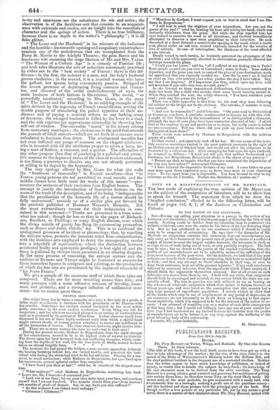NOTE ON A MISAPPREHENSION OF MR. MERIVALE. THE best mode
of explaining the true opinion of Mr. MsarvALE on the subject of the emigration of labourers, will be to allow him to speak for himself. The statement from which we drew the "implied conclusion," alluded to in the following letter, will be found at pages 145, 6, 7, of the Lectures on Colonization and Colonies.
TO THE EDITOR OF THE SPECTATOR.
SIR—Excuse my calling your attention to a passage in the review of my Lectures on Colonization, which I find in your paper of Saturday the 19th of this month. Nothing could be further from my intention than to controvert the writer's criticisms, even were the notice he has taken of me less flattering than it is. But he has attributed to me one sentiment which I should be really sorry to be suspected of entertaining. He says that "the discussion of Mr. llderivale on emigration contains this statement, that our manufacturers can only carry on their business at the present rate of profit by means of a sufficient supply of labour to meet the largest sudden demand; the labourers in slack or average times of trade being out of work, or only partially employed. The fact may be true ; but we demur to the justice of the implied conclusion, that the profits of our manufacturers are to be upheld by means of the sufferings of the poor, or an increase of the poor-rates. On the contrary, we hold that if any poor artisans can benefit their condition by emigrating, they have an undoubted right to do it ; and that any attempt to throw obstacles in their way, or even to deny them assistance, is an act of the grossest injustice." If any such conclusion followed by necessary inference from the arguments which I have employed, I should think the arguments themselves unsound. But at all events no such inference was drawn from them by me. I hold with my critic, that emigration should both be encouraged and assisted, to any extent which the state can rea- sonably afford. The fact in question was only adduced by me as bearing on the schemes of wholesale emigration which were rather in fashion fourteen or fifteen years ago, and were based on the assumption that this country had a very large amount of superfluous population. I merely wished to show that all the hands which may be out of employment at any period of depression in our commerce, are not necessarily to be set down as belonging to that super- fluous multitude, which it is supposed to be for the interest of the nation to re- move. I am ashamed of troubling you on a matter of such little consequence at this busy time ; but I would not willingly have any one of your readers be- lieve that I had inculcated on my Oxford hearers the doctrine that the profits of manufacturers are to be balanced, in any way, against the wellbeing of the great labouring body of the community. I remain, Sir, yours faithfully, H. MERIVA.LE.


























 Previous page
Previous page